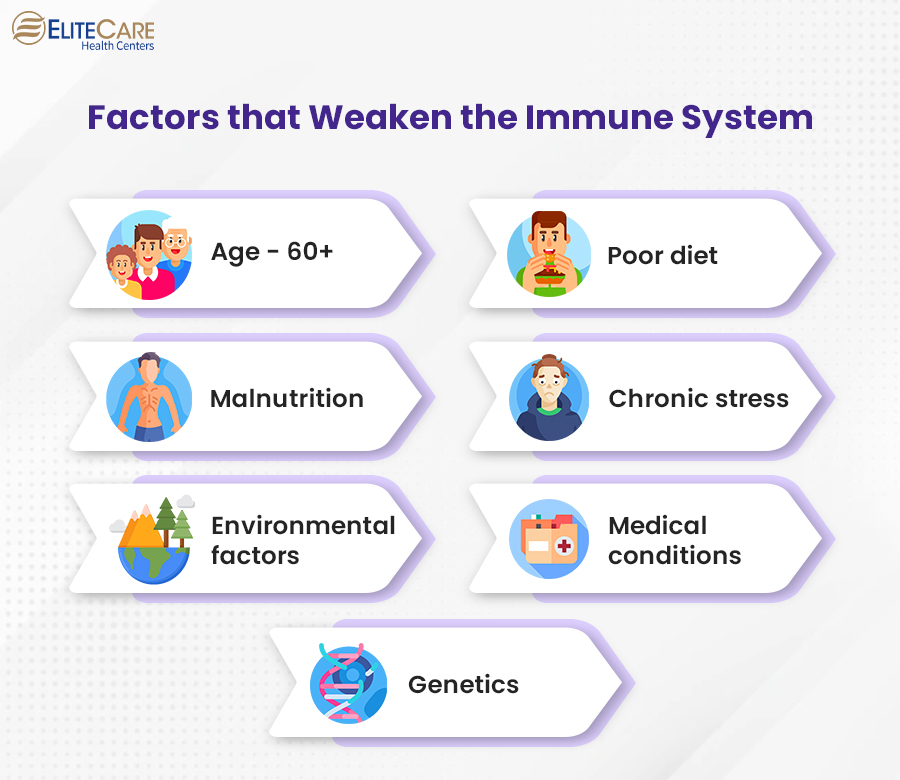
The immune system is a complex network of cells, tissues, and organs that work together to protect the body against harmful foreign invaders like viruses and bacteria. It is a powerful defense system that constantly guards the body, identifying and destroying any potential threats to health and well-being.
However, with increasing levels of pollution, sedentary lifestyles, and poor dietary habits, keeping the immune system strong has become challenging. Therefore, it has become important to take preventative measures that can strengthen one’s immune system which can then defend the body against viruses and bacterial infections.
In this blog post, we will share six effective ways that can strengthen the immune system and help in maintaining optimal health. Read on to learn more.
Factors that Affect the Immune System

Here are the main factors that can negatively affect the immune system’s ability to protect the body effectively.
Age
As a person ages, their immune system naturally weakens, making them more susceptible to infections and illnesses. This is because the immune system becomes less efficient at identifying and destroying harmful pathogens with age.
Poor Diet
A diet that is high in processed foods, saturated fats, and sugar can weaken the immune system, making it more difficult for the body to fight off infections. This is because these foods have the potential to increase inflammation in the body and decrease immune cell development.
Malnutrition
Vitamin and mineral deficiencies make it more challenging for the body to fight against illnesses. This is particularly true for individuals who are undernourished or have undergone surgeries or are undergoing long term medical treatments.
Stress
Stress hormones can reduce the production of immune cells and weaken the body’s ability to fight off infections.
Environmental Factors
Exposure to pollutants, toxins, and other environmental factors can weaken the immune system and increase the risk of infections. These toxic elements can irritate the body and harm immune cells.
Medical Conditions and Treatments
The immune system can be weakened by several medical conditions such as cancer and related treatments such as chemotherapy which damage the immune cells. As a result, cancer patients undergoing treatment are more susceptible to infections and may have a harder time recovering from illnesses.
Genetics
Immune system disorders can be inherited in some people, which may impair their bodies’ capacity to fight off diseases and infections.
Overall, individuals need to understand the numerous aspects that can affect the immune system. Hence, the best way to support a healthy immune system is to consult a doctor to learn what is causing it to malfunction and to determine necessary preventative measures.
6 Ways to Strengthen the Immune System

Good Diet and Nutrition
For a healthy immune system, it is important to ensure that one is consuming adequate amounts of nutrients through diet or supplements. It involves prioritizing nutrient-rich foods such as:
- Citrus fruits like oranges, grapefruits, lemons. Also, berries, kiwi, and papaya provide antioxidants and other important vitamins and minerals.
- Leafy green vegetables like spinach, kale and other vitamins A, C, and E, rich vegetables like broccoli, sweet potatoes, and bell pepper
- Lean proteins like chicken, turkey, fish, and beans
- Whole grains like brown rice, quinoa, and whole wheat bread
- Fat-free or low-fat dairy products like skim milk, low-fat or fat-free frozen yogurt, and fat-free cream cheese
However, excessive consumption of certain vitamins and minerals can be harmful. Therefore, if a person is considering taking nutritional supplements or making any changes in their regular diet, it is crucial to consult a doctor or a dietitian. They can recommend proper dietary changes to ensure that individuals meet their body’s specific nutritional needs without compromising their health.
Exercise and Physical Activity
Exercise helps the body produce anti-inflammatory immune cells and activates the lymphatic system to remove toxins. According to research studies, regular exercise lessens the risk of viral infections and the severity of their symptoms. A healthy immune system is strongly associated with regular, moderate exercise.
Get at least 30 minutes of moderate intensity exercise each day, such as brisk walking or cycling.
8 Hours of Restful Sleep
Maintaining a strong immune system requires good sleep and sufficient rest. During sleep, the brain processes information, consolidates memories, and releases hormones. This regulates various bodily functions such as production of immune cells and antibodies that strengthen and regenerate the immune system. Deep sleep cycles begin about one hour after a person falls asleep. During this stage, the body is most relaxed, and breathing and heart rate are at its slowest.
During sleep, the brain processes information, consolidates memories, and releases hormones. This regulates various bodily functions such as production of immune cells and antibodies that strengthen and regenerate the immune system.
Sleep deprivation can impair immune function, putting a person’s health at significant risk. Aim for at least 7-8 hours of sleep per night and prioritize good sleep hygiene practices, such as avoiding screens before bedtime and creating a relaxing environment.
Stress Management
Stress, both physical and mental, can impair the immune system. Numerous studies in psychoneuroimmunology show that persistent stress can decrease the immunological response, making it crucial to prioritize stress reduction and relaxation for a strong immune system.
Hence, it is important to prioritize stress management techniques such as meditation, deep breathing, yoga, and spending time outside to reduce stress levels.
Maintain personal Hygiene
A person gets in contact with millions of germs every day. These germs and bacteria progressively weaken the immune system, causing people to fall ill more frequently. Therefore, it is crucial to practice good personal hygiene, such as frequent hand washing, bathing, brushing teeth, and avoiding touching the face, especially in outdoor places to stop the spread of harmful viruses and bacteria.
Read More: Importance of Hand Hygiene for Seniors
Take all recommended vaccines
Vaccinations are a secure and reliable way to guard against infectious diseases that can impair immunity. A virus or bacteria that have been weakened or rendered inactive are introduced into the body by a vaccine, which generates an immune response that guards against subsequent infections.
Following the recommended vaccine schedule for children and adults can help prevent illnesses like measles, mumps, rubella, chickenpox, and influenza, which can be particularly dangerous for people with weakened immune systems.
In case of any physical injuries or sickness, one must always consult a doctor and get recommendations for the appropriate vaccines that can help their immune system to fight bad bacteria and viruses.
When to See a Doctor
Individuals should pay attention to their body’s signals when they sense a decrease in their immunity, such as experiencing frequent flu and slow wound healing. These symptoms may indicate a weakened immune system that requires immediate medical attention. Seeking medical attention is crucial to determine the underlying cause and receive appropriate treatment.
For any queries or concerns about seniors’ health, contact EliteCare Health Centers, One of the best medical clinics in Florida. We offer a wide range of primary care services like venipuncture, immunizations, EKG and more. Schedule an appointment to consult our team of highly trained primary care physicians.
- Tags:Immune System






